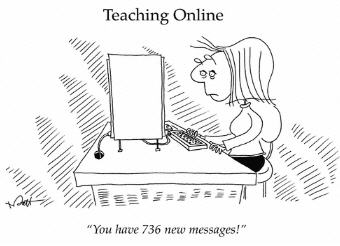 The
Warwick school committee voted 4-0 to offer online
courses to high school students, despite the lack of any
evidence that students learn well when taking such courses. The schools’
director of secondary education played a video touting the virtues of online
learning before the vote. That was it.
The
Warwick school committee voted 4-0 to offer online
courses to high school students, despite the lack of any
evidence that students learn well when taking such courses. The schools’
director of secondary education played a video touting the virtues of online
learning before the vote. That was it.
Peter
SanGiovanni, a teacher at Pilgrim, said the jury is still out on VHS.
“The
U.S. Department of Education said there have been very few case studies done to
prove this is an effective way of teaching,” he said.
SanGiovanni mentioned a study that was done by NPR that looked at more than 300 VHS-type programs and found that not only were two-thirds of those programs not educationally rigorous enough, but that when looking at students that participated in a full-time VHS program compared with full-time classroom students, the graduation rate for full-time VHS students was less than half of full-time classroom students.
SanGiovanni
also questioned how VHS students would be policed in terms of taking exams.
Meredith
McSwiggan, a special education teacher at Gorton, said her experience with VHS
was not a positive one.
“I
had a student years ago that was a struggling student and he couldn’t get
through the English 9 course. I can’t say that he learned anything by taking
the VHS course,” she said. “You don’t have immediate feedback with virtual
courses, which is something that’s important for teachers.”
One
of the parents that spoke during public comment, who recently completed a
Master of Science online degree, said he didn’t get much out of the course and
received almost no feedback from non-local teachers.
Superintendent
Philip Thornton said VHS would be like a pilot program, with a very small
percentage of students participating.
To
my knowledge, there are no research studies showing the superiority of online classes
over teacher-led, in-person, interactional classes. But there is a significant
industry pressing hard to expand online classes and to make them a graduation
requirement.